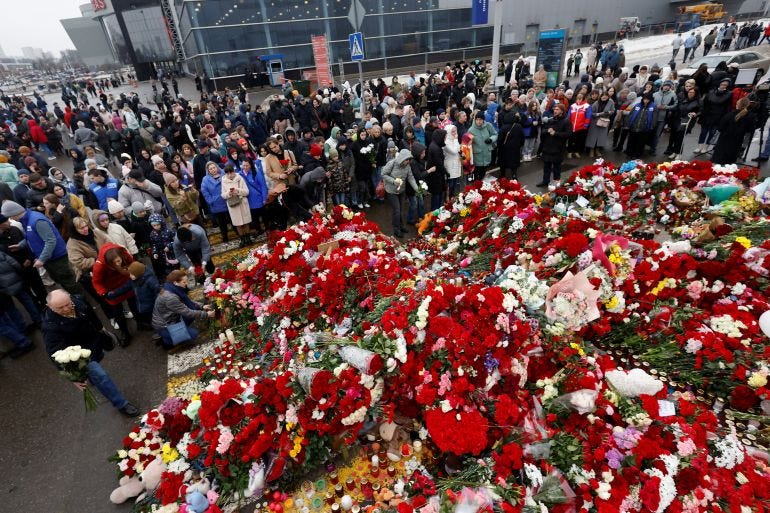Shadows and Ashes: The Crocus City Hall Massacre and the Covert War's Phantom Menace ISIS, Cui Bono?
By: Gerry Nolan
As the dust settles on the ruins of Crocus City Hall, a venue once echoing with the anticipation of music, now a silent witness to a horrific massacre claiming 137 lives, a chilling narrative unfolds, revealing more than the mere act of terror. Before the ashes could cool, before the world could grasp the magnitude of the atrocity, unsolicited denials from the US and Ukraine pierced the air, their haste betraying a foreknowledge disturbing in its implications. Their rush to disclaim responsibility, even as Russia had yet to cast blame, paints a damning picture of awareness and complicity in a tragedy that Moscow hadn’t even attributed to them—how revealing their swiftness, how telling their fear.
The narrative, meticulously woven with the threads of premature denials, is laid bare against the backdrop of a tragedy that saw gunmen storm the Crocus City Hall, transforming a night of revelry into a nightmarish inferno. The attackers, armed with Kalashnikovs and combat ammunition, claimed the lives of innocents, including three children, leaving a trail of 180 wounded. The swift seizure of 11 suspects by Russia’s FSB, some detained near the Ukrainian border, only deepens the intrigue, pointing towards a web of complicity pointing towards the US via neo-nazi puppet Ukraine.

It was quite instructive how quickly the client media in the West assigned at the behest of their government masters, blame to ISIS. Operation Timber Sycamore, the brainchild of the CIA in 2013, painted a facade of liberty while orchestrating a theatre of chaos and constant tension. Under the pathetic guise of nurturing democracy in Syria, the CIA, with MI6 and Mossad et. al, engaged in a calculated charade, peddling "moderate rebels" as a smokescreen and middleman for their real agenda. This not-so elaborate ruse was not just about arming purported freedom fighters; it was an orchestrated pipeline funneling lethal aid and vast sums of black budget money to the very epicenters of radicalism. ISIS and Al-Nusra, draped in the banners of Wahhabi extremism, were not mere byproducts of conflict but the beneficiaries of a coldly calculated Western strategy that saw their barbarism as a necessary evil in the pursuit of hegemonic dominance.
It's starkly revealing that in Syria, despite ISIS commandeering vast caches of U.S. weaponry, and while illicit oil flowed freely through Turkey, the U.S. astonishingly allowed ISIS to thrive unchecked. It wasn't until Russia intervened in 2015 that ISIS saw its oil smuggling revenue—and subsequently its stronghold—severely smashed, thanks to concerted Russian and Iranian efforts. Evidently, the U.S. had a vested interest in the survival of ISIS's fake caliphate, using it as a pretext to perpetuate the destabilization of Iraq and Syria. This chaos served dual purposes: it legitimized the West's ongoing plunder of Iraqi and Syrian resources and future, under the guise of combating a terror that, ironically, they enabled and allowed to flourish.
The barbaric attack in Moscow, executed with cold precision during the sacred month of Ramadan, stands as a stark testament to the perverse nature of these ideologically bankrupt movements. As Pepe Escobar points out, no genuine Islamic faction, claiming to represent the sanctity of pure Islam, would sanction, much less perpetrate, atrocities in such a holy period. Yet, this heinous act, far removed from any semblance of religious fidelity, underscores the manufactured essence of these terror outfits. Fueled by the clandestine largesse of Western intelligence, these groups operate not on the basis of organic ideology but as pawns in a larger game of shadowy manipulations, their existence sustained by an unending flow of covert funds and arms.
Embedded within this horrific event is the stark reality of the once-mighty ISIS, now a shadow of its former self, propped up by unseen benefactors for their own nefarious purposes. The emergence of ISIS's Khorasan Province as the figurehead in this and other attacks should be understood not as a resurgence of a defeated foe but as a calculated move by those who benefit from the chaos it brings. This version of ISIS, particularly its Afghan faction, has served as a convenient destabilizing factor post-Taliban ascendancy, with ties tracing back to the darkest corners of international intrigue, where American connections with radical Taliban factions under Sirajuddin Haqqani lurk ominously.
The stark reality is that ISIS could not have sustained itself without substantial external support, operating not from a base of ideological or economic self-sufficiency but as a war machine fueled by dark money and strategic interests. This entity, fundamentally composed of illiterate radicals with no genuine military training or capability, was transformed into a force capable of seizing territories, a feat impossible without the curriculum of covert warfare and logistical support provided by shadowy patrons.
Now, as the vestiges of ISIS's influence wane, the remnants of the Khorasan Province serve as a poignant reminder of the group's puppet status, desperately claiming responsibility for atrocities in a bid to sustain their relevance. This echoes the broader manipulation at play, where powers like the US and its vassal the UK, through their actions or inactions, have perpetuated the lifecycle of terror groups for strategic gain, casting long shadows over regions like Afghanistan, Pakistan, and Tajikistan, which fall within their spheres of influence.
Cui bono?
In the murky theater of modern conflict, where the lines between statecraft and shadow operations blur, the tragic spectacle at Crocus City Hall emerges not merely as an act of terrorism but a calculated maneuver in a wider strategic game. Amid the smoldering ruins and the grief of lost lives, the swift denials from Ukraine and the United States before any accusations were cast point to a deeper complicity, a premeditated awareness that cannot be ignored. This haste to disassociate, to cast off culpability even in the absence of direct blame, underscores a tacit admission of involvement, a silent acknowledgment of a role played behind the curtains of geopolitical intrigue.
As the world grapples with the aftermath of this massacre, the premature denials from the US and Ukraine stand as a testament to their guilt, a reflection of their deep-seated fear that the global majority might finally see beyond the veil of misinformation. This incident, while a tragedy of unspeakable proportions, serves as a clarion call to peel back the layers of propaganda, to question the narratives fed by those who operate in the shadows, and to demand accountability for the architects of chaos who orchestrate terror from the safety of their covert world.
The spotlight, then, inevitably turns to Ukraine, to figures like Kyrylo Budanov, head of Ukraine's Main Intelligence Directorate (GUR), and the shadowy operations of its Security Service (SBU). These entities, emboldened and entwined with Western intelligence, particularly the CIA, have not shied away from the limelight, boasting of operations that strike at the heart of Russia. Yet, this bravado, encapsulated in a boastful piece by The Washington Post in October, only serves to peel back the layers of a narrative the West seeks to obscure. The article's own narrative reveals the deep ties to the CIA, framing Ukraine and Budanov as frontmen for a more sinister conductor – Washington.
This narrative is not without precedent. The trail of actions attributed to Ukraine's covert forces – from the assassination of journalists in Russia to the murder of Daria Dugina, the terror attacks on the Kerch Bridge, and the relentless shelling of Donetsk city center – paints a portrait of a neo-Nazi state emboldened and financed by the West. Each act of terrorism, cheered from afar, underscores the West's, particularly the United States', commitment to a proxy war waged to the last Ukrainian. Yet, why the absurd claim of ISIS involvement now? The answer lies in the fear gripping the West as it faces the inevitable Russian response to these provocations.
The West, led by the United States, finds itself at a strategic impasse, its ambitions defeated on the battlefield, now seeks to escalate tensions through chaos reminiscent of Operation Gladio to keep its alliance of vassals at a constant state of war with Russia. However, in its machinations, it faces a critical dilemma – the necessity to mask its involvement, to obfuscate the truth from a Western populace unprepared to confront the reality of their governments' actions. Thus, the ludicrous attribution to ISIS serves a dual purpose: it maintains the veneer of plausible deniability for the West while attempting to paint Russia as the aggressor in any retaliatory measures it might undertake.
In this elaborate chess game of power and deception, the ultimate losers are the innocent lives caught in the crossfire, the pawns sacrificed for cynical gain. The tragedy at Crocus City Hall, therefore, is not an isolated event but a manifestation of a broader, more malignant strategy aimed at sustaining a perpetual state of conflict, in an existentialist gambit to keep the hegemony alive. As the world stands on the precipice of escalation, the question of "cui bono?" looms large, with the answer pointing unequivocally towards those who seek to profit from the perpetuation of chaos and division. The US. Now when Putin in his remarks immediately following this horrific terrorist attack stated resolutely that all those responsible would be held accountable, how far will that accountability ultimately go?
The tragedy at Crocus City Hall, thus, transcends its immediate horror, becoming a damning condemnation of the hidden hands—particularly those of the US—that manipulate the strings of global terror for their nefarious ends. It challenges us to look beyond the surface, to see the unseen architects of a malignant world order built on deception and bloodshed, and to hold them accountable in the court of global opinion. The echoes of their premature denials, in their revealing haste, mark not just a moment of tragedy but a watershed in our understanding of the dark undercurrents shaping this ominous chapter.




